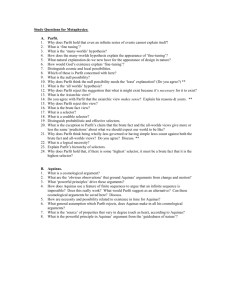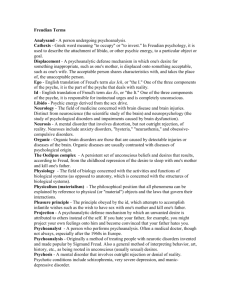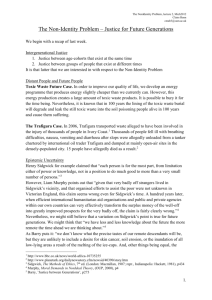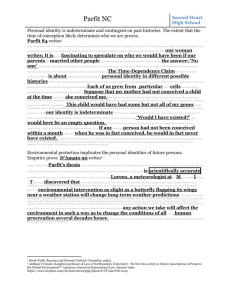Past Desires and the Dead
advertisement
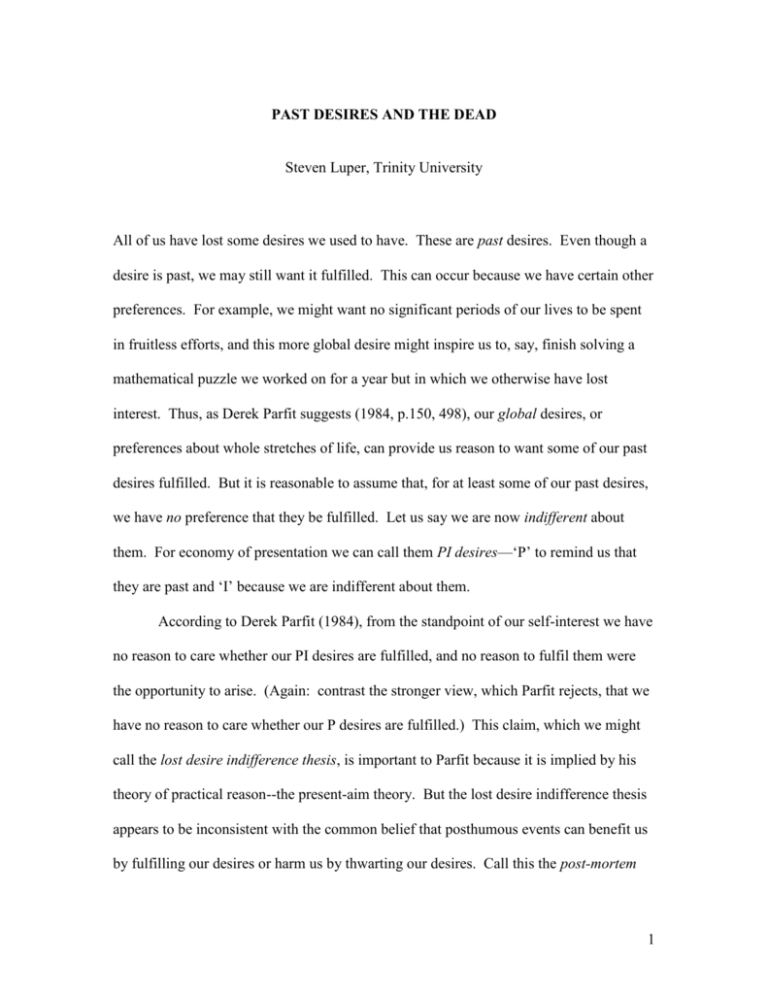
PAST DESIRES AND THE DEAD Steven Luper, Trinity University All of us have lost some desires we used to have. These are past desires. Even though a desire is past, we may still want it fulfilled. This can occur because we have certain other preferences. For example, we might want no significant periods of our lives to be spent in fruitless efforts, and this more global desire might inspire us to, say, finish solving a mathematical puzzle we worked on for a year but in which we otherwise have lost interest. Thus, as Derek Parfit suggests (1984, p.150, 498), our global desires, or preferences about whole stretches of life, can provide us reason to want some of our past desires fulfilled. But it is reasonable to assume that, for at least some of our past desires, we have no preference that they be fulfilled. Let us say we are now indifferent about them. For economy of presentation we can call them PI desires—‘P’ to remind us that they are past and ‘I’ because we are indifferent about them. According to Derek Parfit (1984), from the standpoint of our self-interest we have no reason to care whether our PI desires are fulfilled, and no reason to fulfil them were the opportunity to arise. (Again: contrast the stronger view, which Parfit rejects, that we have no reason to care whether our P desires are fulfilled.) This claim, which we might call the lost desire indifference thesis, is important to Parfit because it is implied by his theory of practical reason--the present-aim theory. But the lost desire indifference thesis appears to be inconsistent with the common belief that posthumous events can benefit us by fulfilling our desires or harm us by thwarting our desires. Call this the post-mortem 1 thesis. (For a fuller discussion of this thesis, see the essays in Fischer 1993, and Luper 2002 and 2004.) Hence, if all of this is true, Parfit will have established something surprising, namely, reason itself commits us to the view that we are neither harmed nor benefited by the impact of posthumous events on our desires. Theorists who reject the post-mortem thesis would perhaps welcome this result. But Parfit doesn’t. In this essay I will examine the argument that appears to take us from Parfit’s lost desire indifference thesis to the conclusion that the effect of posthumous events on our desires is a matter of indifference. I suspect that many of Parfit’s readers, including Mark Vorobej (1998), think that he is committed to (something like) this reasoning, and that Parfit must therefore give up the post-mortem thesis. However, as it turns out, the argument is subtly equivocal and does not commit Parfit to the post-mortem thesis. I will close with some doubts about Parfit’s case for his indifference thesis. Let’s start by following the lost desire indifference thesis to one of its implications, namely, the lost desire harmlessness thesis, according to which we are not harmed by the thwarting of desires we cease to have and no longer want fulfilled, and we are not benefited when such PI desires are fulfilled. The reasoning from the one claim to the other seems straightforward so long as we make the eminently plausible assumption that we have prima facie reason to do something if it will benefit us or if it will prevent harm to us: 1. We have no reason (not even prima facie reason) to fulfil our PI desires even when we can (the lost desire irrelevance thesis). 2 2. If the thwarting of our PI desires harms us, or if fulfilling them benefits us, then we have prima facie reason to fulfil them when we can. 3. So the thwarting of our PI desires does not harm us, and fulfilling them does not benefit us (the lost desire harmlessness thesis). It is the lost desire harmlessness thesis itself that seems most clearly incompatible with the post-mortem thesis. For posthumous events that thwart our desires occur only after we want nothing at all, so the posthumous thwarting of some desire harms us only if we are harmed by the thwarting of a desire we have lost and no longer want fulfilled. Such harm cannot occur if the lost desire harmlessness thesis is correct. Recapping: 3. The thwarting of our PI desires does not harm us and fulfilling them does not benefit us (the lost desire harmlessness thesis). 4. All desires that are thwarted or fulfilled by posthumous events are PI desires (they are thwarted or fulfilled after we have lost them and no longer want them fulfilled). 5. So the posthumous thwarting of a desire does not harm us and the posthumous fulfilling of a desire does not benefit us. Given 3-5, it appears that Parfit should deny the post-mortem thesis. After all, 5 itself looks to assert the denial of the post-mortem thesis. Yet Parfit does not reject the post-mortem thesis (see, e.g., p. 495, where he comes close to asserting that posthumous events can harm us). Nor does he acknowledge any incompatibility between the lost desire harmlessness thesis and the post-mortem thesis. In fact, he says that the desires of the dead are irrelevant to his discussion of past desires (p. 152). This remark seems misleading, as Mark Vorobej claims: 3 if one can defensibly claim that a person’s welfare can be affected by whether certain of their desires are satisfied after their death, this appears to add credibility to the claim that a living person’s welfare can be affected by whether certain of their desires are satisfied once those desires are past. It would be odd to accept the former claim, and deny the latter. Why should it, in a sense, be easier to affect someone’s welfare after they are dead, rather than when they are still living? (1998, pp. 312-13; cf. Note 11, where Vorobej says that Parfit’s treatment of the desires of the dead “implicitly contradicts” his claim that the fulfilling of past desires has no impact on personal welfare.) Put another way, Vorobej’s point, roughly, is this: if we deny 5 (while retaining 4) we may infer the falsity of 3. And presumably Vorobej’s point in asking why it should be easier to affect someone’s welfare after they are dead is to draw our attention to the fact that the desires that might be fulfilled or thwarted by posthumous events are PI desires. So if Parfit acknowledges that posthumous events can affect our welfare by fulfilling or thwarting our desires, he had better abandon his lost desire harmlessness thesis. Worse yet, assuming 2, he better also abandon his lost desire indifference thesis, and the theory of practical reason that entails this thesis. Does 1-4 commit Parfit to denying the post-mortem thesis? Despite the appearances, it does not. There are two ways to interpret 2, 3 and even 5, one Parfit would accept, and one he would not, and on neither reading do 1-4 position us to conclude that a proponent of the indifference thesis must deny the post-mortem thesis. The impression that 1-4 condemn the post-mortem thesis involves the fallacy of equivocation. To help us sort out these two readings, let us ask why Parfit defends 1, the 4 lost desire indifference thesis. Doing so will help us to determine how he would interpret 1-5 as a whole. Why does Parfit say that we lack reason to fulfil our PI desires? His official case involves an appeal to examples. We will examine it later. But he also has the resources to offer a second, as it were unofficial, case, which is simply that his thesis follows from his present-aim theory of practical reason. Parfit supports his present-aim theory partly on the basis of the lost desire irrelevance thesis; to then base the latter on the former would be to argue in a tight circle. But he also supports his present-aim theory on the basis of considerations that are independent of his thesis (notably various claims about personal identity). Insofar as it rests on these independent grounds, he can appeal to the present-aim theory in support of the lost desire irrelevance thesis without circularity. The present-aim theory is best explained in contrast to a more traditional view of self-interest called neutralism. According to neutralism, mere temporal proximity rationally ought not to matter to us when we assess benefits and harms to ourselves. We ought not to care less about things that benefit us during past stages of our lives or during future stages of our lives simply on the grounds that these stages are temporally distant. We should want what most enhances our lives as wholes, minimizing harms and maximizing benefits regardless of their temporal positions in our lives. (Contrast the view that says we may care less about benefits and harms because of their temporal positions in our lives, but we may not become completely indifferent about them.) There are various ways welfare might be understood. The one that features most prominently in Parfit’s discussion is roughly the (desire-fulfilment) view that benefit to me consists in 5 the fulfillment of my desires, and harm amounts to their being thwarted. (Parfit discusses various alternatives to this formulation, and ways of qualifying it, but I shall set them aside; see, e.g., pp. 8, 120.) On this assessment, the neutralist theory of self-interest says, roughly, that I have a (prima facie) reason to care about an event (or state of affairs) E if and only if E will fulfil or thwart any of the desires I have during my life. According to the present-aim view, we incur benefits and harms to ourselves in a temporally relative way. The question, ‘Does such and such benefit or harm me?’ should be replaced with the question, ‘Does such and such benefit or harm me now?’ On this view, we consider benefit to me now, or to me yesterday at noon, or to me tomorrow at three o’clock, but not benefit to me simpliciter, and I-now have reason to care about an event E if and only if E will benefit or harm me-now. We-now should want what enhances our welfare now, maximizing benefits (and minimizing harms) to ourselvesnow. Parfit discusses various ways such temporally relative benefit is to be understood, but once again the desire-fulfilment theory features most prominently in his discussion. By putting the notion of temporally relative benefit together with the desire-fulfilment theory, we arrive at roughly the position that I-now ought to do whatever will best fulfil the desires I have now (just as I-yesterday ought to have done whatever would best fulfil the desires I had then, and I-tomorrow ought to do whatever will best fulfil the desires I have tomorrow). Hence on the present-aim theory, I-now have (prima facie) reason to care about an event (or state of affairs) E if and only if E fulfils or thwarts desires I have now. I-now have a (prima facie) reason to take action A if and only if A helps me to fulfil my present desires. 6 So stated, the present-aim theory does not imply that I should care now only about what is happening now. At each time I have reason to care about events that are temporally distant, and to want such distant events to occur. Thus I-yesterday would be benefited if I-now satisfied a desire I had yesterday (say, the desire that I now complete work I started yesterday), and this prospect gives me-yesterday reason to want me-now to act. Nonetheless, I-now have no reason to act if there is nothing in it for me-now. I-now ought rationally to ask only, ‘What’s in it for me-now?’ On the present-aim view, we really do lack reason to fulfil our PI desires: the lost desire indifference thesis is correct. Or rather: we-now lack reason to fulfil a desire that we-then had but we-now no longer have or care about. It does not matter that we-then are harmed; we-now have better things to do than to worry about than harm to ourselvesin-the-past. Here the present-aim view is sharply at odds with neutralism. What thwarts the desires of ourselves-in-the-past harms ourselves-in-the-past; harm to ourselves-in-thepast is still harm to us, and hence, on neutralism, we-now have (prima facie) reason to fulfil these desires. With Parfit’s theory of reason in mind, let us reconsider the argument from 1 and 2 to 3: 1. We have no reason to fulfil our PI desires even when we can (the lost desire indifference thesis). 2. If the thwarting of our PI desires harms us, or if fulfilling them benefits us, then we have prima facie reason to fulfil them when we can. 3. So the thwarting of our PI desires does not harm us, and fulfilling them does not benefit us. 7 Note that 2 could be construed in either of two ways: 2a. If the thwarting of a desire D after we become indifferent about D harms us after we become indifferent about D (or if fulfilling D after we become indifferent about D benefits us after we become indifferent about D), then, when we can, we have prima facie reason to fulfil D after we become indifferent about D. (Alternatively and more generally: if we-now can do something that would benefit us-now, or prevent something from harming us-now, we-now have prima facie reason to do so.) 2b. If the thwarting of a desire D after we become indifferent about D ever harms us (either before or after we become indifferent about D), or if the fulfilling of D ever benefits us, then we have prima facie reason to fulfil D, where possible, after we become indifferent about D. (Alternatively and more generally: if we-now can do something that would benefit us at some time, or prevent something from harming us at some time, we-now have prima facie reason to do so.) Claim 3 might also be understood in different ways; it might mean either of the following: 3a. The thwarting of a desire D after we become indifferent about D does not harm us after we become indifferent about D. 3b. The thwarting of a desire D after we become indifferent about D does not harm us ever. Consider how we will interpret 2 and 3 if, like Parfit, we accept the present-aim theory. Given that theory, 2a is true while 2b is false, and 3a is true while 3b is false. Hence 1-3 give way to: 8 1. After we become indifferent about a desire we have no reason to fulfil it even when we can. 2a. If the thwarting of a desire D after we become indifferent about D harms us after we become indifferent about D (or if fulfilling D after we become indifferent about D benefits us after we become indifferent about D), then, when we can, we have prima facie reason to fulfil D after we become indifferent about D. 3a. So the thwarting of a desire D after we become indifferent about D does not harm us after we become indifferent about D (but it might harm us before we have become indifferent about D). Now consider 4 and 5: 4. All desires that are thwarted by posthumous events are PI desires (they are thwarted after we have become indifferent about them). 5. So the posthumous thwarting of a desire does not harm us. Premise 4 is straightforward enough, but 5 is ambiguous. It might mean either of the following: 5a. The posthumous thwarting of a desire D does not harm us after we become indifferent about D (but it might harm us before death makes us indifferent about D). 5b. The posthumous thwarting of a desire D never harms us (not even before death makes us indifferent about D). If we accept Parfit’s theory, we will accept 5a since 3a and 4 imply it. By the same token we will reject 5b. For Parfit, 3-5 give way to: 9 3a. The thwarting of a desire D after we become indifferent about D does not harm us after we become indifferent about D (but it might harm us before we have become indifferent about D). 4. All desires that are thwarted by posthumous events are PI desires (they are thwarted after we have become indifferent about them). 5a. So the posthumous thwarting of a desire D does not harm us after we become indifferent about D (but it might harm us before we become indifferent about D). We can now see that Parfit need not deny the post-mortem thesis. His assumptions commit him to 5a, not 5b, and while 5a is entirely consistent with the postmortem thesis, 5b is its denial. Those who say that posthumous events can harm us are not always specific about when the harm is incurred, but many if not most of them do not think that it is after we have died that we are harmed by the posthumous thwarting of our desires. Instead, they believe that the harm comes while we are still alive. The clearest exponent of this position is George Pitcher (1984). Parfit may accept it, too, judging from remarks such as the following: “Suppose that my children’s lives all go badly only after I am dead. My life turns out to have been a failure, in one of the ways I cared about most (495).” And it is entirely reasonable. We can say that an event that is responsible for our coming to be in a bad (good) condition is an indirect harm (benefit), while the bad (good) condition itself is the direct harm (benefit). If, for example, a terrorist rigs your car to explode when you return from Europe and turn the key, he has indirectly harmed you, and the injuries you sustain in the blast are direct harms. We can say that, while posthumous events do not harm us directly, they do harm us indirectly. The direct harm 10 is that certain things come to be true of us by virtue of the posthumous events that occur later. Suppose, for instance, that after you die someone spreads a vicious lie about you that destroys your reputation. Indirectly, you are harmed by the libelous gossip. The direct harm consists in the fact that the proposition, ‘your desire to have a good reputation long after you are dead is to be thwarted’ is true of you. You incur this harm while you are alive. More specifically, you incur it while you want an unsullied reputation. Posthumous events help bring it about that ‘certain desires of ours will be thwarted, certain goods unattained’ is true of us, and its being true of us is the direct harm for which the corresponding posthumous events are responsible. We incur this direct harm while we are alive, at the time ‘certain desires of ours will be thwarted, certain goods unattained’ is true of us. Let us turn to the alternative reading of 1-5, which is as follows: 1. After we become indifferent about a desire we have no reason to fulfil it even when we can. 2b. If the thwarting of a desire D after we become indifferent about D ever harms us, or if the fulfilling of D ever benefits us, then, when we can, we have prima facie reason to fulfil D after we become indifferent about D. 3b. So the thwarting of a desire D after we become indifferent about D never harms us (not even before we become indifferent about D). 4. All desires that are thwarted by posthumous events are PI desires (they are thwarted after we have become indifferent about them). 5b. So the posthumous thwarting of a desire never harms us. 11 As we said, proponents of Parfit’s present-aim theory would reject this argument, even though 1 is true, on the grounds that 2b and 3b are false. What about advocates of the traditional theory of self-interest? It goes without saying that they would reject 1— Parfit’s lost desire indifference thesis. Everything being equal, we do have reason to fulfil a desire after we lose it, assuming we are in a position to do so, since thereby we avoid harm to ourselves. (The dead have no reason to fulfil any desires, but they also are in no position to do so.) And while advocates of neutralism will accept 2b, they join proponents of the present-aim view in denying 3b. Indeed, neutralists should accept the version of Parfit’s lost desire harmlessness thesis that we have attributed to Parfit, namely 3a. If we are harmed by the thwarting of a desire we no longer have, as when posthumous events thwart our desires, we incur the harm earlier, before the thwarting takes place, while we still have our desires. May neutralists argue that, since 5b is false and 4 is true, 3b is false, and since 3b is false while 2b is true, then Parfit's lost desire indifference thesis is false? Certainly. But as a criticism offered to a proponent of the lost indifference thesis, such as Parfit, this argument begs the question, since it makes an assumption--2b--that would be denied by anyone who accepts 1. (For similar reasons, neutralists cannot criticize Parfit on the grounds that if he were to assume 1, then, given 2b, he would be committed to 3b, and ultimately to 5b.) We have seen that Parfit’s lost desire indifference thesis, supplemented with plausible assumptions, commits him to the conclusion that the posthumous thwarting of our desires does not harm us posthumously, but not to the conclusion that the posthumous thwarting 12 of our desires never harms us. I will close with some comments about Parfit’s official case for his lost desire indifference thesis. Parfit’s official case is independent from the unofficial case, in that the former is supposed to help establish the present-aim theory and hence cannot assume it. His case is an appeal to two examples of PI desires—two cases of desires to which he has become entirely indifferent. Example A: When I was young what I most wanted was to be a poet. This desire was not conditional on its own persistence. I did not want to be a poet only if this would later still be what I wanted. Now that I am older, I have lost this desire. I have changed my mind in the more restricted sense that I have changed my intentions. But I have not decided that poetry is in any way less important or worthwhile. (157) Example B: Suppose that, for fifty years, I not only work to try to save Venice, but also make regular payments to the Venice Preservation Fund. Throughout these fifty years my two strongest desires are that Venice be saved, and that I be one of its saviours. . . . Suppose next that I. . .cease to have these desires. . . .Have I still a reason to contribute to the Venice Fund? (152) Writing poems (in example A) or contributing to the Fund (in B) would fulfil the desire Parfit no longer has, yet it is “hard to believe” that he has a reason to write poems or to contribute. Why is it so hard to believe? The best explanation is that the lost desire irrelevance thesis is true. So his examples, and others like them, support the lost desire irrelevance thesis (and, since the irrelevance thesis is inconsistent with neutralism, this fact lends support to the present-aim theory). 13 As Parfit explains, even if we accept neutralism, we will grant that there are factors given which we lack reason to satisfy a desire. First, a desire might be implicitly conditional on its own persistence, in the sense that we want to satisfy it only on condition that we still have it. Once we have lost such desires, clearly it is unimportant to satisfy them. Second, we might change our values or ideals, which might lead us to condemn certain desires. In this case it is reasonable to forego any opportunity to satisfy them. When a property, such as conditionality, undermines the importance of satisfying a desire, so that we lack a reason to satisfy it, let us say that it is an undermining feature. Everyone, including neutralists, can agree that conditionality and dependence on revised values are undermining features of desires. If either were a feature of the desires involved in Examples A and B, Parfit could not adduce them in support of the indifference thesis. But the desires in Examples 1 and 2 do not have these features. Something else must be responsible for undermining them. Parfit’s suggestion is that his indifference about his desires is itself the undermining feature. According to him, unless we may ignore desires specifically because we are indifferent about them, we must say that he has “strong reason to try to write poems” even in the absence of any desire whatever to do so. Yet “most of us would find this claim hard to believe.” (157) I believe that most of us will agree with Parfit’s impression that, having given up all poetic aspirations in Example A, he no longer has any reason whatever to write poetry. Remember, we are assuming that even if, in A, Parfit has a second-order desire that his life as a whole be successful, or the like (and, indeed, Parfit endorses such global desires; see, e.g., p. 497), he is still completely uninterested in poetry. We must imagine that, in designing his plan for his life as a whole, he bypasses his earlier aspirations 14 concerning poetry. He has a plan that draws upon other ambitions to make his life an overall success. His life could easily be an overall success if he abandons his childhood aspiration to write poetry. He might instead write Reasons and Persons. What Parfit says about Example B is less straightforward (Vorobej 1998). Parfit’s life could be a success if, for a month, perhaps a year, he tries hard to save Venice, and then abandons his goal. But Parfit’s example has him spending fifty years desperately working for Venice. It is hard to see how he could make his life an overall success if he completely abandons his project. Assuming he has something like this second-order desire, he has prima facie reason to complete his project, as Parfit must acknowledge. He will lack all reason only if he is wholly unconcerned about the overall shape of his life. Few of us are so callous, and so few of us will take B to be an example in which there is no reason to save Venice. Parfit could salvage his example, saying that, in it, he does not care about the way his life turns out overall, but some will say he is asking us to reflect about a creature so bizarre it is hard to form a reliable intuitive response to it. (Compare: for fifty years I wanted to save Venice, but now I simply want to be a fish; do I have any reason to contribute to the Venice Fund?) No matter: Parfit can rely on the one example. What should we make of Parfit’s claims about A? It is plausible to say with Parfit that, in A, his poetic aspiration is undermined and that the undermining feature is not its conditionality or dependence on revised values. But it does not follow that the undermining feature is the indifference with which Parfit regards his desire. The neutralist can resist Parfit’s indifference thesis by pointing to some other undermining feature at work in the example. 15 Most of our desires are tentative in the sense that we adopt them in the expectation that we may later revise them. For example, we revise our desire for D by wanting D less than before. An extreme way to revise a desire for D is to stop wanting D altogether--to end the desire for D, say on the grounds that it conflicts with other, more pressing interests. Of course, our desires are not fully in our control. Nonetheless, we favor some of the ways they change, and take what steps we can to coax them in preferred directions; similarly, we disapprove of some of the ways our desires change and resist these changes as best we can. As a rough approximation, we may say that, unless our desires change in ways we (do or) would oppose, the changes are voluntary. For our purposes we can even count, as voluntary, the intentional elimination of a desire using artificial means, as when we take pills to remove the desire to smoke cigarettes. If we voluntarily stop wanting D, our desire for D can no longer be thwarted. If I set out to get ice cream, but stop before I have a chance to take it out of the fridge, my project has not been thwarted, it has been discontinued. So we undermine a desire when we voluntarily abandon it. The fact that desires are undermined when voluntarily abandoned explains our indifference in Example A. (It can also explain indifference in the salvaged version of B.) Parfit voluntarily abandoned his childhood ambition to be a poet. Even a neutralist will say that he subsequently had no reason to write poetry. The claim that we have no reason to fulfil desires we have voluntarily abandoned is similar to Parfit’s claim that we have no reason to fulfil PI desires. But there is an important difference. While voluntarily ending a desire undermines it, things are quite different when our desires are removed against our wills. When this is done, our desires 16 (or ones that are not thwarted by being removed) can still be thwarted, and they are not always undermined. Yet removing desires against our wills does transform them into PI desires. Suppose, for example, that, before Parfit completed it, I destroyed the manuscript of Reasons and Persons, but first I gave him a drug that removed any desire (including second-order desires) he had in completing his book. Neutralists who say voluntary abandonment undermines desires can make several plausible assertions about this example that are inconsistent with Parfit’s indifference thesis. First. Parfit has reason to take an elixir that would restore the desires I have taken from him, because otherwise he will have undergone the misfortune of becoming indifferent about his project. Second. Suppose there is no such elixir. If Parfit had a backup draft of his book (perhaps one of the many manuscripts worked over by his friends), and could still finish it with little effort, he would have reason to do so, because otherwise he will have undergone a misfortune (namely, it will be true of him that his goal was thwarted). Third. The situation changes dramatically if, in a completely voluntarily way, Parfit ends his desire to finish his book (perhaps choosing instead to spend more time with his family). It then is not true of him that his goal was thwarted. What is true of him is that he abandoned his goal midstream, which is hardly a misfortune. Steven Luper, Trinity University References Luper, S, 2002. “Death,” Stanford University Encyclopedia of Philosophy, Edward N. Zalta, Editor. 17 ----- 2004. “Posthumous Harm,” American Philosophical Quarterly 41: 1, 63-72. Parfit, D., 1984. Reasons and Persons. Oxford: Clarendon Press. Pitcher, G., 1984. “The Misfortunes of the Dead,” American Philosophical Quarterly 21: 2, 217-225. Reprinted in Fischer 1993: 119-134. Fischer, J.M., ed., 1993. The Metaphysics of Death. Stanford University Press. Vorobej, M., 1998. “Past Desires,” Philosophical Studies 90: 305-318. 18 PAST DESIRES AND THE DEAD Steven Luper Trinity University 1-9-2004 19

